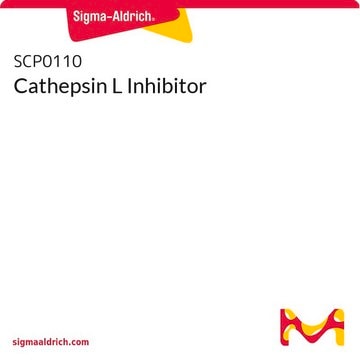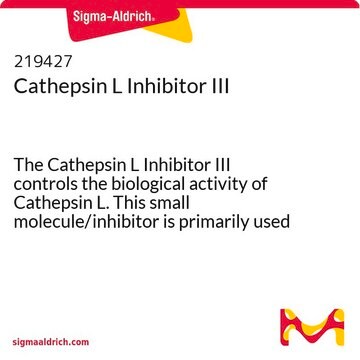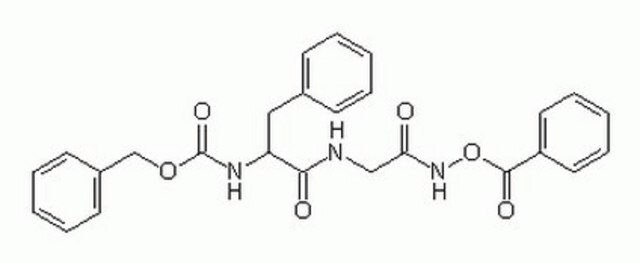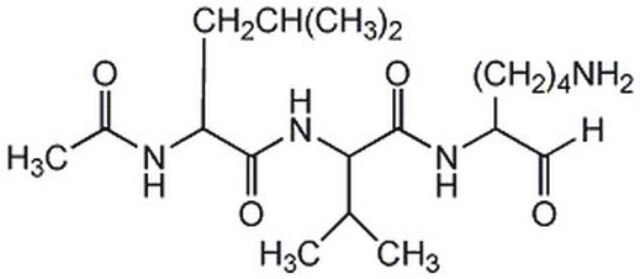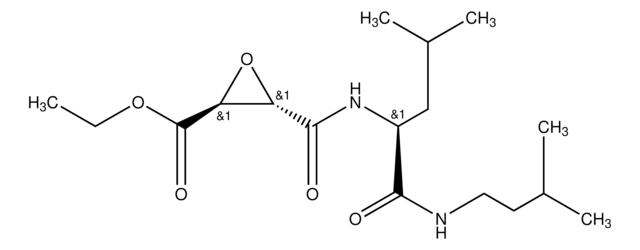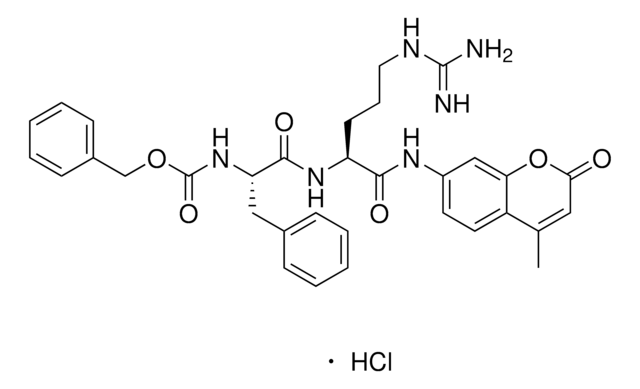219426
Cathepsin L Inhibitor II
The Cathepsin L Inhibitor II controls the biological activity of Cathepsin L. This small molecule/inhibitor is primarily used for Protease Inhibitors applications.
Synonym(s):
Z-FY-CHO
Sign Into View Organizational & Contract Pricing
All Photos(1)
About This Item
UNSPSC Code:
12352200
NACRES:
NA.77
Recommended Products
Quality Level
assay
≥95% (HPLC)
form
solid
manufacturer/tradename
Calbiochem®
storage condition
OK to freeze
color
off-white
solubility
ethanol: 50 mg/mL
DMSO: soluble
shipped in
ambient
storage temp.
−20°C
General description
A potent and selective inhibitor of Cathepsin L (Cat. No. 219402).
Biochem/physiol Actions
Cell permeable: yes
Product does not compete with ATP.
Reversible: no
Packaging
Packaged under inert gas
Warning
Toxicity: Standard Handling (A)
Sequence
Z-Phe-Tyr-CHO
Other Notes
Woo, J.-T., et al. 1996. Eur. J. Pharmacol. 300, 131.
Legal Information
CALBIOCHEM is a registered trademark of Merck KGaA, Darmstadt, Germany
Storage Class
11 - Combustible Solids
wgk_germany
WGK 1
flash_point_f
Not applicable
flash_point_c
Not applicable
Certificates of Analysis (COA)
Search for Certificates of Analysis (COA) by entering the products Lot/Batch Number. Lot and Batch Numbers can be found on a product’s label following the words ‘Lot’ or ‘Batch’.
Already Own This Product?
Find documentation for the products that you have recently purchased in the Document Library.
Customers Also Viewed
Stephan Quintin et al.
The Journal of biological chemistry, 299(7), 104912-104912 (2023-06-13)
α-synuclein (αS) is an abundant, neuronal protein that assembles into fibrillar pathological inclusions in a spectrum of neurodegenerative diseases that include Lewy body diseases (LBD) and Multiple System Atrophy (MSA). The cellular and regional distributions of pathological inclusions vary widely
Prashant Gaikwad et al.
microPublication biology, 2022 (2023-01-07)
Several studies have indicated a role for cathepsin L (CTSL) proteolytic activity in the nucleus under distinct cellular conditions, including during differentiation, senescence, and quiescence. Here we show that addition of CTSL inhibitors to a cell lysis buffer prevents the
Our team of scientists has experience in all areas of research including Life Science, Material Science, Chemical Synthesis, Chromatography, Analytical and many others.
Contact Technical Service